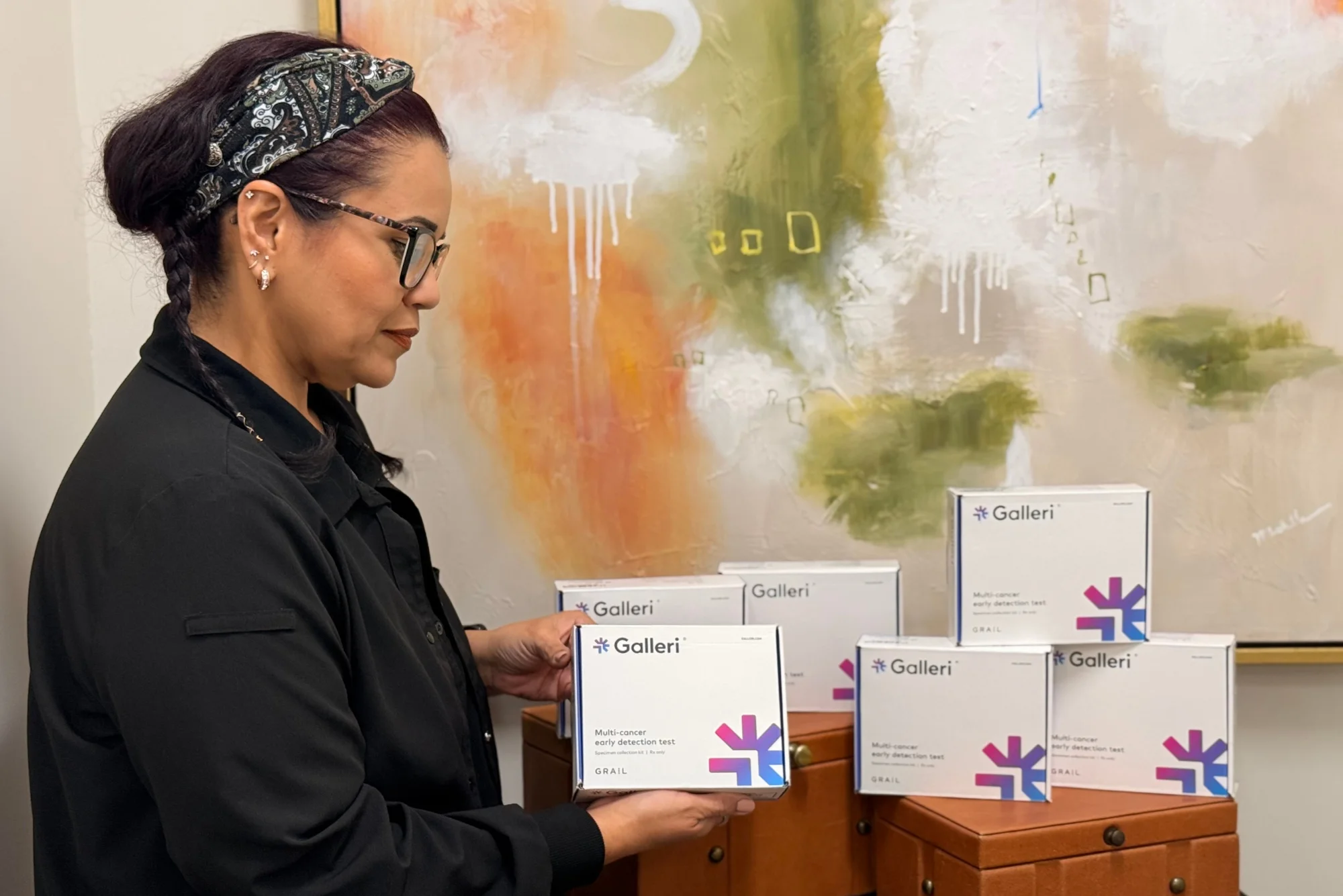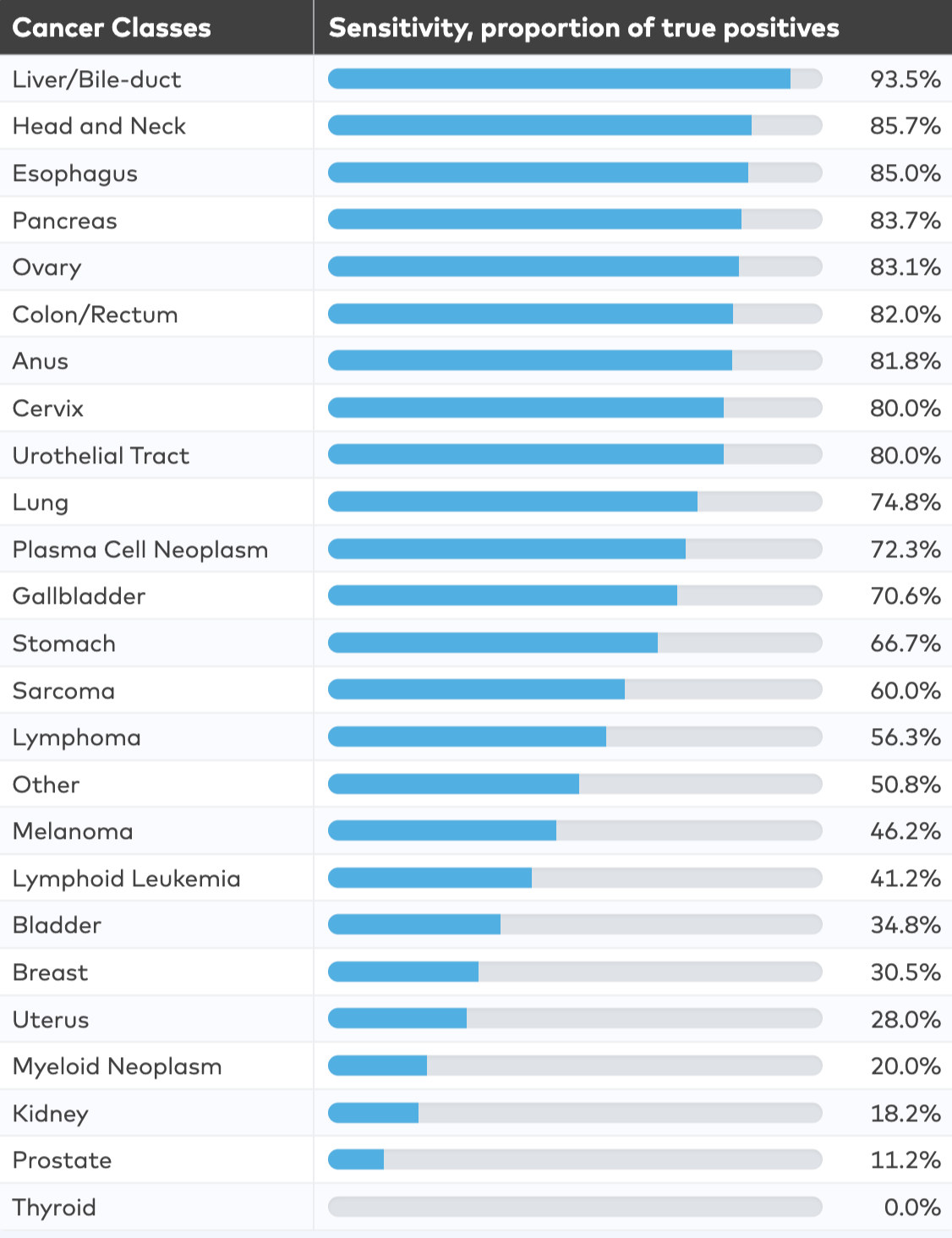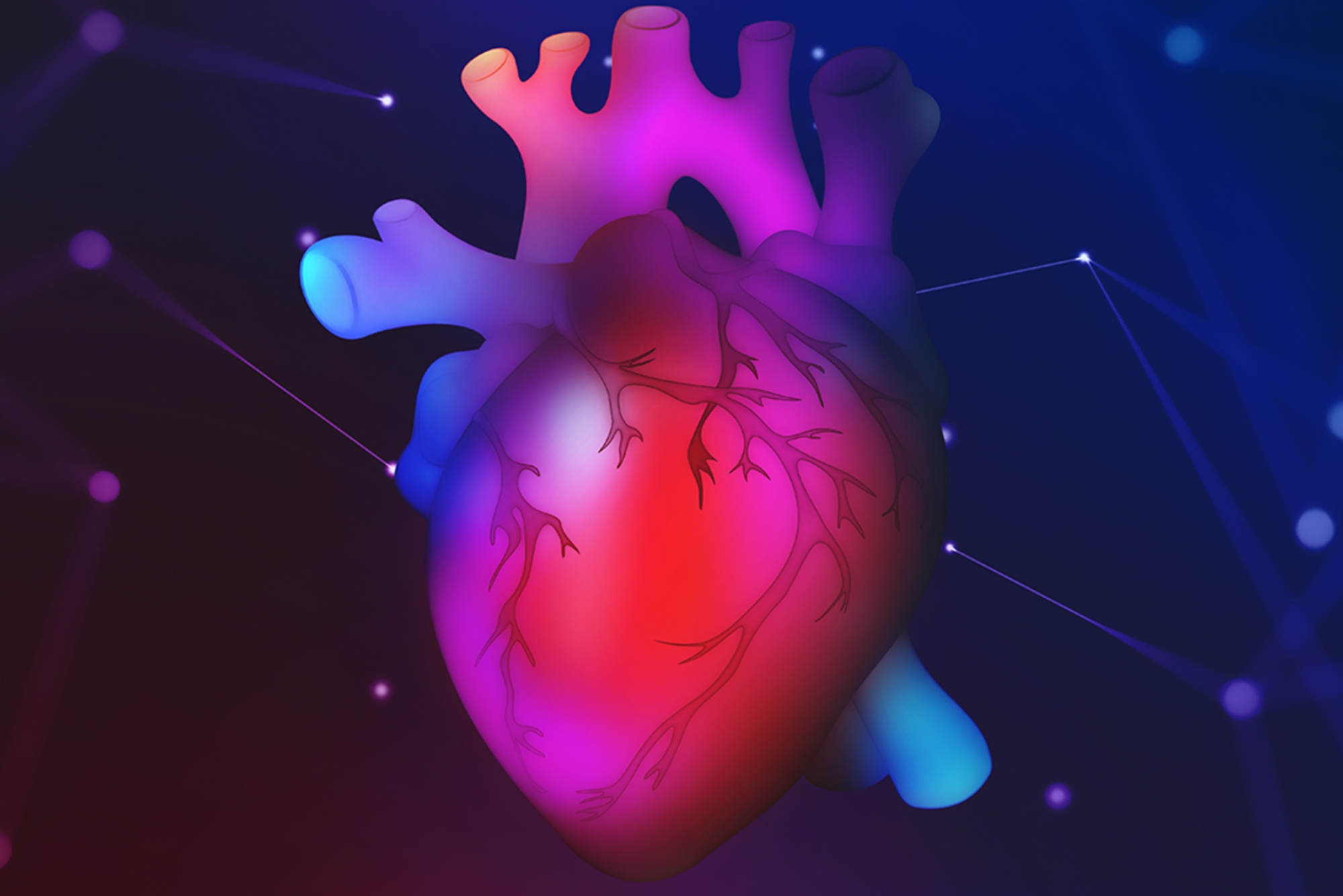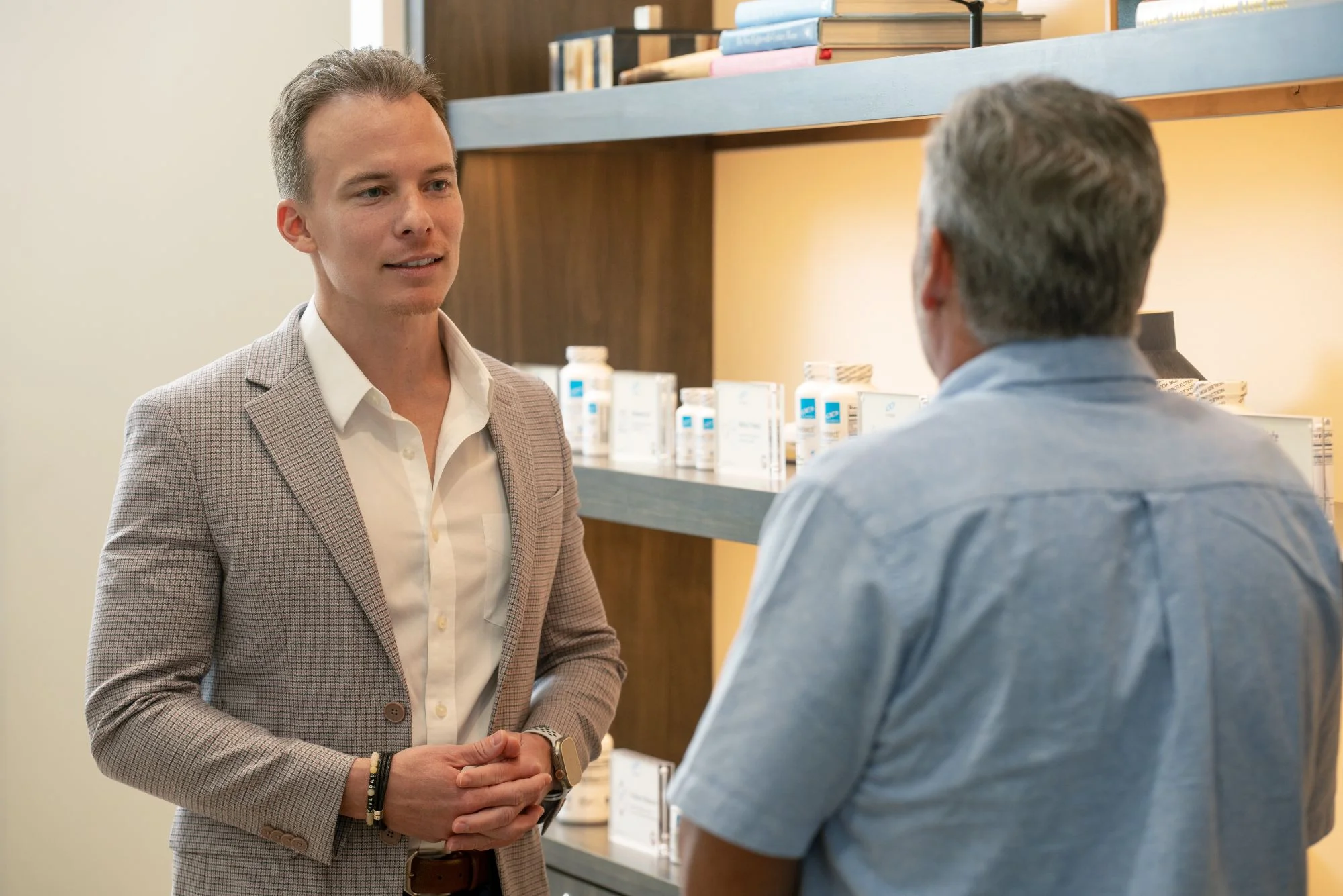
Prevention-First Concierge Medicine Still Comes First
Cancer remains a leading cause of death worldwide, in part because many cancers develop silently, often progressing before symptoms even appear. Traditional screening has helped reduce mortality for some cancers, like breast and colon, but over 70% of cancer deaths are caused by cancers with no recommended screening test.
At Griffin Concierge Medical, we are dedicated to advancing personalized, preventive care. One powerful tool we use is the GRAIL Galleri® test — a multi-cancer early detection (MCED) test that screens for a signal associated with 50+ types of cancer through a single blood draw performed in our office.
The Compelling Case for Multi-Cancer Early Detection (MCED)
Finding cancer before it causes symptoms can allow for more treatment options and better outcomes.
While deaths from many cancers in the U.S. have decreased or remained stable over recent decades (thanks to earlier detection, better treatments, lifestyle changes), new diagnoses of cancer in earlier age groups and for certain types are increasing.
Many of those cancers rising in incidence are ones for which we don’t yet have good routine screening, such as pancreatic cancer, liver cancer, and some gastrointestinal cancers. (Some of the uptick may be due to better detection and awareness rather than a true epidemic of more aggressive disease.)
With this shift, early detection tools become much more compelling. That’s where the Galleri test comes in.
Recent data from the large PATHFINDER 2 study showed that when Galleri was added to existing U.S. Preventive Services Task Force (USPSTF) A and B–recommended screenings for breast, cervical, colorectal, and lung cancers, the number of cancers found within a year increased by more than seven-fold. When Galleri was layered on top of breast, cervical, colorectal, lung, and prostate screenings (USPSTF A, B, and C recommendations), it detected approximately three times as many cancers as standard screening alone — and about three-quarters of those cancers did not have a standard-of-care screening option. More than half of the new cancers detected were stage I or II, and nearly 70% were stage I–III, underscoring the potential impact of finding cancer earlier.
“We’re getting better at screening for cancer—testing more, detecting more, helping our patients live longer. We’re always adding tools to the toolkit, and Galleri is one we think can make a difference,” says Radley Griffin, MD, Founder & CEO of Griffin Concierge Medical.
Understanding the Galleri Multi-Cancer Early Detection Test
Galleri is a simple blood test designed to detect a shared cancer signal. It is not meant to diagnose cancer; its primary function is to detect a signal that could indicate cancer is present, often before symptoms appear.
If a signal is detected, the test predicts the cancer signal origin (CSO)—where the signal originates in the body—and helps guide follow-up diagnostics.
What Types of Cancer Can Galleri Detect?
The Galleri test screens for 50+ types of cancer, including many that don’t have standard screening guidelines, such as:
- Pancreatic cancer
- Ovarian cancer
- Stomach cancer
- Liver cancer
- Kidney cancer
- Esophageal cancer
- Certain blood cancers
Some of the cancers Galleri can help detect early are among the most aggressive and deadliest, often going undetected until it’s too late.
Galleri Accuracy: What the Data Shows
The Galleri test has been evaluated in thousands of patients and in extensive clinical studies.

(Source: Galleri® for Healthcare Providers).
- Low False-Positive Rate: In the PATHFINDER 2 study, Galleri demonstrated 99.6% specificity, corresponding to a false-positive rate of just 0.4%. In other words, it rarely signaled cancer when none was present.
- Strong for Hard-to-Screen Cancers: For cancers without standard screening (e.g., pancreas, liver, ovary), sensitivity (i.e., ability to correctly identify people who have cancer) is relatively high. For instance, pancreatic cancer showed a sensitivity of ~83.7% overall in certain studies. PATHFINDER 2 also reported a 73.7% episode sensitivity for the 12 cancers responsible for roughly two-thirds of U.S. cancer deaths, many of which do not have routine screening.
- Overall Sensitivity and Cancer Signal Origin: For all cancers combined, episode sensitivity in PATHFINDER 2 was 40.4%, consistent with earlier data for multi-cancer detection. Importantly, when a cancer signal was detected, the test correctly identified the Cancer Signal Origin (CSO) about 92% of the time, which can help streamline targeted imaging and specialty referrals.
- A Critical Caveat: Even with these encouraging results, Galleri does not detect every cancer. A negative result does not guarantee that you are cancer-free. We use Galleri alongside standard screenings and clinical context as an additional tool that may help catch cancers that otherwise slip through — it does not replace current screening standards.
Who Should Consider the Galleri Test?
In our concierge medical practice, there is no “one size fits all” approach — and that includes cancer screening. As with any test, whether Galleri is right for you should be a shared decision between you and your Griffin physician.
Generally, Galleri is intended for adults with an elevated risk of cancer, typically:
- Age 50 or older
- Those with a family history or genetic predisposition
- People with past exposure risks (e.g., smoking, radiation)
- Anyone who wants more proactive screening coverage
The test is not recommended for:
- Individuals under 22
- Those pregnant
- People currently being treated for cancer
The Griffin Approach: Prevention is the Cornerstone
At Griffin Concierge Medical, we do not see Galleri as a replacement for existing cancer screening tests, but as a powerful enhancement.
1. Layered Screening and Personal Risk Assessment
We integrate Galleri into a comprehensive, personalized strategy:
- Combined with Standard Screenings: We layer Galleri on top of traditional screenings (such as colonoscopy and mammography) for broader coverage.
- Non-Invasive Options for Colorectal Cancer Screening: Through our partnerships with Cologuard and Guardant Health, we also offer non-invasive stool and liquid biopsy screenings when needed.
- Advanced Whole-Body Imaging: To complement Galleri’s blood-based detection, we may also consider whole-body MRI as an advanced, non-radiation imaging modality. This provides a deeper look at structural and anatomical changes that may not yet present clinical symptoms, enabling early detection of solid tumors and other abnormalities. When combined with Galleri, this layered approach enhances sensitivity and specificity—giving you the most comprehensive, multi-modal view of your health.
- Personalized Assessment: We assess your family history, lifestyle, and genetics to decide, together, if Galleri makes sense for you.
2. Lifestyle is the Best Medicine
Even with innovative tools, prevention remains the cornerstone. We help you optimize the factors that dramatically lower your cancer risk:
- Regular exercise (cardiovascular and strength training)
- Healthy diet
- Better sleep
- Stress management
- Limiting alcohol
- Smoking cessation
Galleri is a powerful tool, but it’s not a substitute for healthy choices or medical vigilance.
3. Seamless Follow-Up and Partnership
At Griffin, we ensure that if a signal is detected, you are not left waiting or navigating the system alone. We guide you through the next steps:
- Coordinating imaging and diagnostics
- Facilitating immediate specialty referrals (e.g., to our partner Moffitt Cancer Center)
- Providing ongoing support from your Griffin physician and care team
Real-World Patient Impact
Our partnerships with local and national institutions, which include Florida Cancer Specialists, Moffitt Cancer Center, Johns Hopkins, MD Anderson Cancer Center, Dana-Farber Cancer Institute, Mayo Clinic, Cleveland Clinic, and Memorial Sloan Kettering Cancer Center, coupled with our partnerships with Galleri and other like-minded healthcare professionals help us deliver the highest level care to our patients—and a real-world example illustrates this:
Last year, one of our Griffin members received a positive result from the Galleri test, indicating a potential blood cancer signal. This prompted an immediate referral to one of our trusted partners.
The oncology care team worked diligently to investigate the finding, and through additional testing, they were able to confirm the exact type of blood cancer, allowing the patient to begin treatment promptly.
Throughout the process, the Galleri team remained engaged with us, reaching out to follow up and learn more about the outcome.
Innovative early-detection tools, paired with strong clinical partnerships, can help patients get answers and start treatment sooner. The collaboration among our Griffin physicians, our specialist network, and the Galleri team helped streamline the path from early signal detection to definitive diagnosis and care.
“At Griffin, we continue to push forward when it comes to the health of our members, and it’s nice to have partners who feel the same way,” says Dr. Griffin. “We think early detection makes a difference, and we align with others who agree.”
Ready to Discuss Galleri?
The Galleri test represents a significant advance in early cancer detection technology.
- Consultation: Talk to your Griffin physician or patient care coordinator about adding the Galleri blood test to your lab panel.
- Cost and Access: The national price for the Galleri test is $949, but Griffin members receive an exclusive member discount.
- Action: Call us today at 813.350.9090 to get started!
Works Cited (External Sources)
- General Cancer Statistics (70% of Deaths from Cancers Lacking Screening):
- Source: NORC at the University of Chicago / GRAIL (Data from SEER)
- Citation for Claim: “The other 57% of cancers do not have recommended screening tests and account for 70% of cancer deaths in the US.”
- Link: https://www.norc.org/
- Rising Cancer Incidence/Screening Uptake:
- Source: American Cancer Society (ACS)
- Citation for Claim: Increasing incidence for six of the top ten cancers (breast, prostate, endometrial, pancreatic, kidney, and melanoma). Also, “new cases of cancer in the US are expected to cross the 2-million mark for the first time” in 2024.
- Link: https://www.cancer.org/research/cancer-facts-statistics.html
- Galleri Test Details/Cancers Detected (50+ Types):
- Source: American Cancer Society (ACS) / Galleri
- Citation for Claim: The Galleri test screens for a signal shared by over 50 cancer types, “most lacking recommended screening tests”.
- Link: https://www.galleri.com/what-is-galleri/types-of-cancer-detected
- Galleri Accuracy (False Positive Rate / PATHFINDER 2):
- Source: GRAIL PATHFINDER 2 Study Results
- Citation for Claim: Specificity was ~99.6%, translating to a false positive rate of only 0.4%; episode sensitivity was 73.7% for 12 cancers causing about two-thirds of U.S. cancer deaths and 40.4% for all cancers.
- Link: PATHFINDER 2 Press Release
- Galleri Sensitivity (Pancreas ~83.7%):
- Source: AAFP/Clinical Studies data (Pathfinder)
- Citation for Claim: Sensitivity for pancreas was ~83.7% (76.6% to 89.0%).
- Link: https://pancan.org/news/the-latest-developments-in-early-detection-for-pancreatic-cancer/
- Standard of Care/Screening Guidelines:
- Source: U.S. Preventive Services Task Force (USPSTF)
- Citation for Claim: Confirms recommended screenings for breast, cervical, colorectal, and lung cancers (for those at risk).
- Link: https://www.uspreventiveservicestaskforce.org/uspstf/recommendation/breast-cancer-screening
- Moffitt Cancer Center Partnership/Location:
- Source: Moffitt Cancer Center
- Citation for Claim: Moffitt is a comprehensive cancer center located in Tampa, Florida, dedicated to patient care, research, and education.
- Link: https://www.moffitt.org/cancers/



